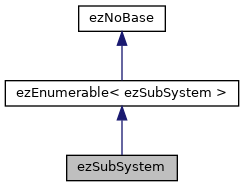 |
ezEngine Release 25.08
|
 |
ezEngine Release 25.08
|
Base class for all subsystems. More...
#include <SubSystem.h>

Public Member Functions | |
| virtual ezStringView | GetSubSystemName () const =0 |
| Returns the name of the subsystem. Must be overridden. | |
| virtual ezStringView | GetGroupName () const =0 |
| Returns the name of the group to which this subsystem belongs. Must be overridden. | |
| virtual ezStringView | GetDependency (ezInt32 iDep) |
| Returns a series of strings with the names of the subsystem, which this subsystem depends on. nullptr indicates the last entry. Must be overridden. | |
| ezStringView | GetPluginName () const |
| Returns the plugin name to which this subsystem belongs. | |
| bool | IsStartupPhaseDone (ezStartupStage::Enum stage) const |
| Returns whether the given startup stage has been done on this subsystem. | |
Friends | |
| class | ezStartup |
Additional Inherited Members | |
 Static Public Member Functions inherited from ezNoBase Static Public Member Functions inherited from ezNoBase | |
| static const ezRTTI * | GetStaticRTTI () |
 Protected Attributes inherited from ezEnumerable< ezSubSystem > Protected Attributes inherited from ezEnumerable< ezSubSystem > | |
| ezEnumerable * | m_pNextInstance |
Base class for all subsystems.
ezStartup will initialize and shut down all instances of this class, according to their dependencies etc. If you have a subsystem that is a non-static class, just derive from this base class and override the virtual functions as required. If you have a subsystem that is implemented in a purely static way (there is no class instance), just use the macros EZ_BEGIN_SUBSYSTEM_DECLARATION, EZ_END_SUBSYSTEM_DECLARATION etc. Those macros will create a wrapper object (derived from ezSubSystem) to handle initialization.